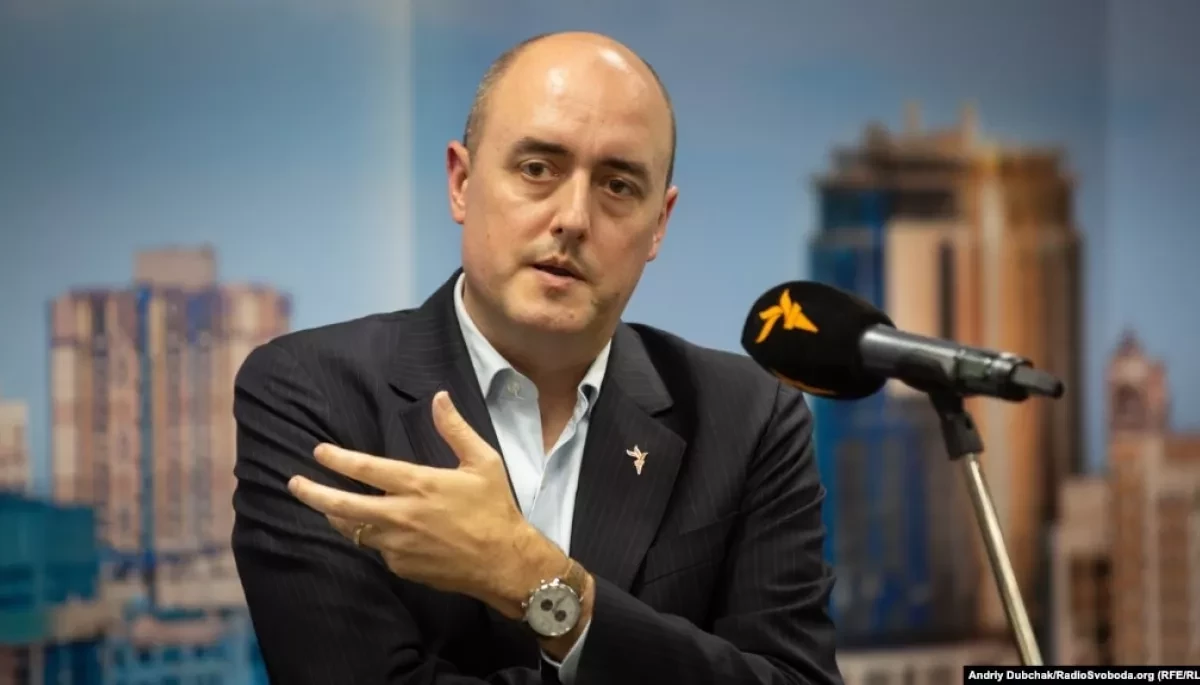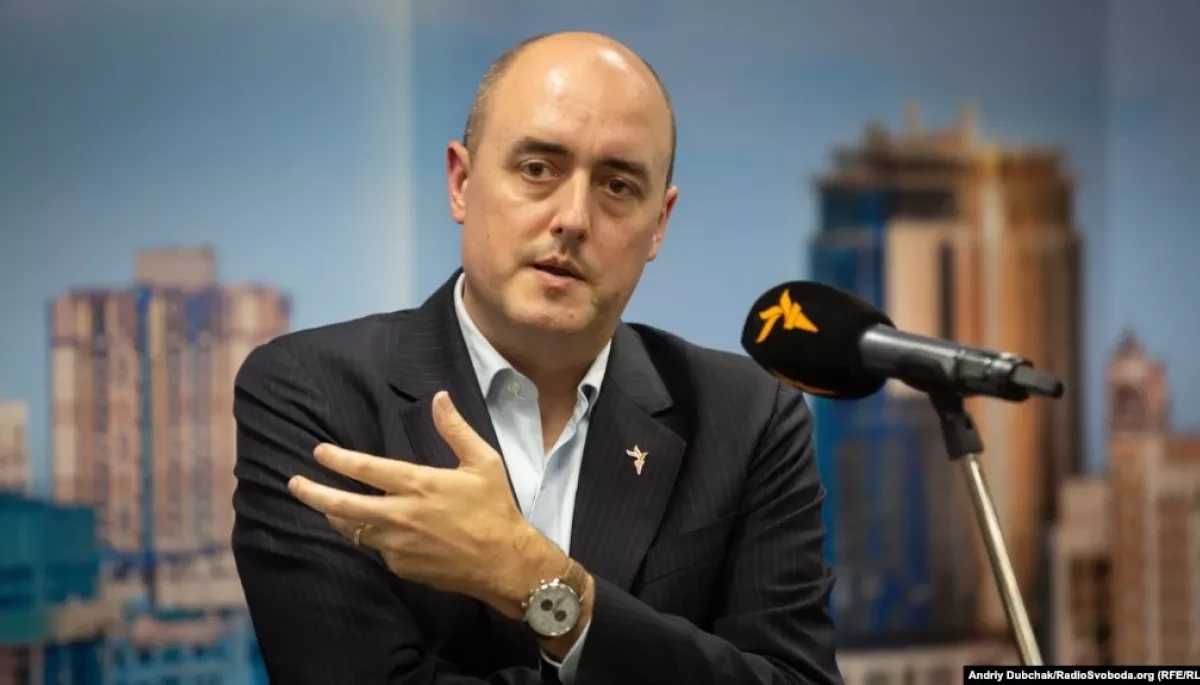
Jamie Fly, RFE/RL: Our Russian journalists have sacrificed everything to do their work for us
Jamie Fly, RFE/RL: Our Russian journalists have sacrificed everything to do their work for us


Українською текст читайте тут.
At the beginning of the year, Radio Free Europe / Radio Liberty solemnly opened an office in Riga, where the Russian service of RFE/RL and “Current Time” will work. At first glance, this event was distant from Ukraine, but it shook the Ukrainian media community: “Detector Media” received messages about it both from RFE/RL employees and from media professionals who had never worked there.
President and CEO of RFE/RL Jamie Fly had time to give us an interview about this project before his resignation.
– In all its press releases RFE/RL said multiple times that you want to reach people who continue living in Russia and who still want to have access to truthful information. But from my perspective, with your Russian-language content you also reach people outside Russia, e.g. Russian-speaking audience in the Baltic states. On the one hand, it is difficult to deliver something to Russian territory. And on the other hand, when I am watching the “Baltiya” program on “Current Time” I am thinking that it is for people in the Baltics because of the content itself. What is your evidence base that you reach people who are living in Russia?
– We have daily digital data about who is watching our content and where they are watching it from. We have surveys that we do on a regular basis in all our markets in Ukraine and Russia. We even do surveys in the Baltic states for Russian speakers to look at whether they are watching our content. And all of our data have shown significant audience growth inside Russia since the start of the full-scale invasion. And by some estimates, we have doubled our audience in Russia in the last several years despite the blocking and the fact that we have had to move a lot of our journalists outside of the country.
In large part it happened because all our content was being related to the full-scale invasion. I think we are the international news organization that has the largest presence of journalists inside Ukraine. We are covering the fighting on the front lines, often at great risk to our journalists embedded with the Ukrainian military. But we are also covering the personal stories of Ukrainians who have been affected by Russia's aggression against Ukraine. And those stories are attracting significant audiences inside Russia and across our entire coverage region.
Wherever I travel across the company – as I have recently visited bureaus in Serbia, Montenegro, Georgia, Bulgaria, Hungary, – we are taking a lot of the reporting from Ukraine about the full-scale invasion, about its impact on Ukraine. We are translating it and making it available in local languages, and it is very popular content because people want to know the facts about this war.
– Do you set as an additional goal the delivery of your Russian-language content to people outside Russia?
– Yes, we reach Russian speakers everywhere. We have always done that through “Current Time”. We have Russian audiences in the Baltic states. We have significant viewership in Israel. And after the full-scale invasion we have been able to place “Current Time” on many new cable partners across the EU. And we have gotten more satellite placement, partly because the Kremlin propaganda outlets are no longer accessible in the EU.
We also have a lot of Russian speakers in Central Asia who follow our content, either through our local Central Asian websites or through “Current Time”. And as we have seen now an influx of migrants from Russia who are fleeing conscription and the sanctions, it created another potential new audience for us in many of these countries: we can more easily reach them outside of Russia than we can inside, given the blocking and other attempts to prevent people from watching our content.
– For sure, I noticed the presence of the president of Latvia at the presentation of your bureau in Riga, as well as the president of Lithuania during same event in Vilnius. But I still would like to ask if Latvian authorities do not mind that you are expanding the reach of your content to the people inside Latvia. Do they see benefits for building resilience in their countries due to this additional content without Russian disinformation for their Russian-speaking minority?
– We have never had any issues with our work in Latvia or Lithuania or the fact that Russian speakers can interact with our content.
Ever since the challenges we have had in Russia, where we had to close our bureau after more than 30 years of existence and we needed a safe location for our journalists, the Latvian government has been very helpful in providing that safe haven for many of our Russian journalists who had to flee Russia. They have known for many years that “Current Time” has significant audience of Russian speakers in Latvia. Actually, “Current Time” originally, before it was a channel, was started as a show that was in part a cooperative project with some of the Baltic public broadcasters. And part of the original intent of “Current Time” was always to reach Russian speakers in that region.
We do objective balanced reporting. And especially in this current environment, where many of their citizens are being subjected to propaganda from Kremlin funded outlets, they are very pleased to have independent Russian perspectives that can be provided to their citizens. We are also highlighting their perspectives and sharing them with Russian speakers everywhere through that new show you mentioned. As you know, the Baltic states are subject to all kinds of propaganda from the Kremlin, and conspiracy theories are spread about how the Baltic governments treat Russian speakers. And that show airs the facts and allows Baltic officials to speak directly to Russian speakers around the world. And I think they appreciate that as a strategic priority right now as well.
– I also read in one of your press releases that in order to deliver your content to Russia you promote the use of VPNs, mirror sites, community messaging through Viber and Telegram, and Tor for web browsing. Do you think that this set of tools is enough under current restrictions of Internet in Russia? Are you looking for additional digital technologies and tools?
– Yes, we are always looking to find the best ways to circumvent authoritarian attempts to block internet access. And we will use whatever platform is necessary, whatever tools are necessary. Also, we are still very active on YouTube, which is not blocked, and on Telegram, as you mentioned.
Ultimately, both for Russia as well as other countries like Iran or a number of Central Asian countries, those who care about democracy and freedom need to work on more technological solutions to prevent authoritarian regimes, like the Putin regime, from controlling what their citizens can read, hear and watch online. And there is going to be some broader technological advances, hopefully with satellite internet in the coming decade, that will allow us to truly put independent information in the hands of every single person who has a cell phone, for instance, which is not possible right now inside Russia or other closed societies. So I think we do need more research and funding.
But given the technological tools currently available, I am confident that we are using every single tool that is out there to reach citizens where their governments are trying to deny them access to truthful information.
– Do you think that Russia will be able to introduce even stronger restrictions on the Internet in the future?
– I hope they will fail.
We are worried that they are not satisfied, that they are going to try to block even more access to independent information. Obviously, there are platforms like YouTube that are available now, which they could eventually block.
I think you also need to look at Belarus as an example of where things could go. It is not just journalists who are in prison there. It is not just a crime to publish certain information. It is also a crime to consume independent information. If you go to a certain website that is supposedly extremist, or if you like or share certain content online, you as the audience member can go to prison. And we have had some reports of our audience in Belarus serving prison time for visiting our website or for liking something on social media. That is a very dangerous situation. That is almost complete repression. And it is something we need to watch when it comes to future Putin regime tactics.
– I would also add that our Belarusian colleagues believe that Belarus is able to overcome Russia in introducing restrictions on the Internet. It was a very well-developed IT community in Belarus and their secret service had benefited from it before the IT community started leaving the country.
– Yes, that certainly matches with what we have heard as we have continued to try to provide news and information to the Belarusian people.
– It is an interesting idea to add to your media assets entertaining online platform “VotVot”. Currently, it is still not much of content there. What are the criteria for adding it to this platform?
– Just to be clear, it is not really entertainment content. It is cultural programming with a purpose. Many of content producers are now foreign agents inside Russia and have not been able to stay there. They have had to flee Russia because of their pro-Ukrainian statements or their criticism of Putin and the regime. And we wanted to give a platform to those content producers who are still producing, whether it is music, cultural programming or documentaries.
“Current Time” has always had not just news but also documentaries as part of the channel. And this is very consistent with what we have done with “Current Time” more recently. And within RFE/RL, we had a long history in almost every service that we operated, including Ukraine and Russia, of producing much more than just news, but also highlighting cultural content.
We found it is a very effective way to engage audiences. And we are hopeful that it will do the same in Russia in this political environment, given the repression and what we just talked about in Belarus. People are hungry for other types of content that they still feel comfortable engaging with despite the fact that the society is changing around them and it is increasingly dangerous for the consumption of independent information.
– Do you have any cases when you offered some content creators in exile to provide your platform with their content and they refused?
– I am not the one going out and procuring every single piece of content.
Not just for “VotVot”, but for “Current Time”, for all of our platforms we are constantly looking for new content producers. I am assuming, in some cases it does not work out for whatever reason: they want more money, or they have another preferred platform. But I am not familiar with any specific cases.
– I am asking about this because it is interesting to try to predict how big your platform could become in the future. Another reason is that we heard some rumors that your team tried to invite Maxim Galkin and he refused.
– I am not aware. I was not involved in any conversations related to him.
– “VotVot” is a website, it is in app stores and on Amazon. Can Russia block the access to “VotVot”?
– I believe they have tried to block it. I am not sure the blocking has been all that effective, though. And they can continue trying. There were also several attempts to attack the project in the pro-Kremlin media, and really almost discouraging Russians from engaging with the content.
They have blocked most of our other websites. But people can use VPNs, there are all kinds of ways to get around the blocking. And just as people have done that to engage with our other types of content, I am confident that they will do the same with “VotVot”.
– During recent months, we received several messages from your employees who complained that almost all senior positions in the editorial office of “Current Time” were occupied by Russians. Does it make sense to introduce some quota approach to the editorial management to be sure that you have people from different regions and bureaus in this media asset?
– We do not impose quotas on any. And I do not think quotas are the right way to approach it.
We have plenty of Ukrainians who work in “Current Time” including leading positions. We have Belarusians. We have Central Asians. “Current Time” is being led by multinational staff. But “Current Time” is a Russian channel. It is not a Ukrainian channel. And, quite frankly, especially given the full-scale invasion, reaching Russian speakers in Ukraine is being mostly done in RFE/RL by the Ukrainian service, which has hundreds of people working for it. We have Russian-language programming being done by the Ukrainian service, which is historically focused on Crimea, Donbas.
I do not think anyone is asking me why are not there Russians working in the Ukrainian service.
– We have also received complaints that there are some persons among the employees of “Current Time” who used to work for Russian state-related propaganda media outlets like Ksenia Sokolyanskaya or Iliya Klishin. Do you see a problem in having the employees with such a background?
– Just to be clear: Klishin does not work for “Current Time “and was not hired to work for it. That was not true.
In all our markets, we hire journalists. We need people who have journalism experience. Quite often, we face the challenge that there is next to no independent media in the country we are trying to reach. So, if we are hiring journalists who have any experience, some of them at one point probably worked for an outlet, which has values very different than RFE/RL. We have a significant vetting process that has multiple stages for anyone that comes to work for RFE/RL, no matter where he or she is coming from, whether it is Russia, Ukraine, you name it. And we look very carefully at people's backgrounds and public statements. We also look at their track record since they had previous employment and look at what else they have done, where else they have worked, whether they have actually done independent reporting.
We take this very seriously. But it is just a reality when you hire Russian journalists today. There is no, especially now, independent media left in Russia. So where are we supposed to hire journalists from? So for me, the key is looking at their track record, talking to them, understanding their views, understanding if they did work somewhere years ago, why it was, how long they were there, what they actually did. And in the case of one of the other journalists that your organization did a story about, we have a long track record of their work here, having reviewed every single year and zero concerns about them or their work.
– Do you mean Ksenia Sokolyanskaya?
– Yes, I mean Ksenia. She has been here for a long time. No one has ever raised any concerns about the reporting that she is done for us. And so, we have no concerns about her work here.
– Unfortunately, we analyzed a track record too and in 2014 she was really working on the wrong side. I understand your position. I understand that if you need professionals, they all have some experience. But I watched a piece of news about RFE/RL in the beginning of the year on one of the U.S. TV channels. And the reporter was interviewing many people from your company, and Ksenia Sokolyanskaya too. He did not know her background because he trusted your brand. And she was saying in that reporting something about the proper time for every honest journalist to leave Russia. And it was a pity that she could rebuild her reputation in the West.
– Like I said, we judge our journalists based on their work that they do for us. We have reviewed their content on a regular basis. And we do significant vetting of every single person we hire and we have no concerns about the people who are currently working for us.
Our Russian journalists have sacrificed everything to do their work for us. They cannot go back to visit family. They are cut off from their loved ones. It is unsafe for them. They are persecuted and chased by the Kremlin, even outside of Russia.












